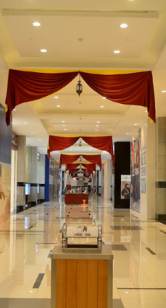
Oman is the last GCC country to offer Islamic finance to their people in 2012. As a newcomer to the industry, it would have been expected that progress would be gradual. This has not been the case. Regulators and banks have been working tirelessly to create the infrastructure necessary for a thriving Islamic financial industry. Already, Oman has two fully-fledged banks offering Shari’a-compliant services, while a number of conventional banks have also forayed into the sector by setting up Islamic windows to capture a slice of the market. Oman has already issued its first sukuk that generates funds to enhance the development of a multi-purpose complex. Al Madina Investment was the arranger. Mr Mohsin Shaik bin Sehu Mohamed, Head of Islamic Finance at Al Madina Investment, discusses the issuance of the first sukuk in the Sultanate.
Recent developments in the sultanate can be considered an impressive achievement for a market barely a year old. Like in other parts of the world, the Omani market has shown enthusiasm in offering Islamic products and services to consumers and corporates. However, all of the concentration has been on normal banking activity, i.e. typical consumer and corporate banking facilities.
The mandate
In late November 2012, we were requested by Tilal Development Company (TDC) to pitch for an advisory role on their funding needs. TDC – 40% owned by Qatar Investment Authority (QIA) – was the company responsible for the development of the Tilal Complex in Muscat. The Tilal Complex is the one and only mixed-use development in Oman, featuring a shopping complex known as Muscat Grand Mall, office towers and a residential complex.
TDC hopes to expand and improve the development from receipts of the sukuk.
Al Madina Investment SAOG (Al Madina) has been in operation since 1998, providing investment banking services but has recently ventured into Islamic finance following the royal decree. Al Madina received a mandate from TDC to structure a sukuk, besting the proposals of a regional bank and two local banks. This was the beginning of Oman’s first sukuk journey.


What’s next?
Because sukuk was relatively new in Oman, a local regulatory framework for this type of sector is currently not available. Although the country’s Capital Market Authority (CMA) is in the process of preparing a sukuk regulation draft, there is no information as to when this will officially be introduced. Nevertheless, as a strong supporter of Islamic finance, CMA gave Al Madina the go-ahead to proceed with the proposed sukuk for TDC and use the existing bond regulation as a guide provided that it complies with both Shari’a and legal requirements.
This was the first step. The next steps were to appoint a rating agency, Shari’a advisors and legal advisors. Morgan Lewis and Bockius acted as the lead legal counsel advising Al Madina supported by a local Omani firm Al Busiady, Mansoor Jamal & Co, who advised on the local regulations. Meanwhile, Trowers & Hamlins acted on behalf of TDC and Amanie Advisors provided their services as the Shari’a advisor for this issuance. Capital Intelligence provided a rating of BBB+ for the issuance The structure and roadshows.
For any sukuk structure, the most important ingredient is the underlying asset. In this case, Muscat Grand Mall represented the underlying asset for the transaction. Considering this asset and the nature of TDC’s business, Al Madina opted for an ijara structure.
As an obligor in the ijara structure, TDC registered a special purpose vehicle (SPV) in Oman to facilitate the issuance. The sukuk of OMR 50 million (USD 130 million) has a maturity of five years and pays a rental (coupon) of 5% per annum.
The most unique item for this sukuk is that there is a legal mortgage created on the Muscat Grand Mall favouring the sukuk holders. The purpose of the legal mortgage is to provide confidence to the local investors given that sukuk is totally new to the market. TDC was supportive enough to provide this.
Following the selection of the structure came the drafting of the prospectus and legal documents, which had to comply with local regulations. While this process was taking place, Al Madina embarked on the road shows marketing to pension funds and banks in Oman. The marketing process had a dual effect: it informed potential investors of the sukuk and it also educated potential local investors on Islamic finance.
Many of the pension funds, banks and companies visited have shown genuine interest in investing in sukuk. Some of them even immediately expressed commitment to support the TDC sukuk.
The issuance
The issuance date for the TDC sukuk was October 30, 2013, nearly 11 months since Al Madina received the mandate. This was a historic day for Oman’s Islamic finance sector. On that day, TDC and other stakeholders executed all the legal documents. The legal opinion was issued and funds were transferred from investors to the transaction account. Finally, TDC became the first corporate to issue a sukuk in Oman.
For the issuance of this sukuk, Al Madina played the main role as the principal advisor. Along with Bank Nizwa SAOG, Al Madina also served as one of the joint lead arrangers and joint lead managers. Bank Dhofar SAOG and Qatar International Islamic Bank also participated as joint lead managers.
ISFIRE Comment
Issuing the first sukuk in any country is always a milestone because it paves the way for further issues. How the country reacts thereafter cannot be easy to gauge. International Innovative Technologies, a technology company based in the UK, issued a corporate sukuk in 2010, yet the UK sukuk market remains in stasis. Government support cannot be understated and so it is refreshing to see Oman take a proactive stance to the development of the sukuk industry. The CMA has issued draft sukuk rules and the government of Oman have stated that they are seeking to issue a sovereign sukuk in 2014. So all the signs are pointing in the right direction. Still, abecedarian governments and regulators need the assistance of experienced institutions to help it determine the framework needed for the industry to thrive. An important aspect of the globalised world is the advice of private and public entities in fostering transactions. Sukuk is no different, and we can see with Al Madina sukuk the con_uence of parties such as US law Morgan Lewis and Bockius and Qatar International Islamic Bank in contributing to the structuring of the sukuk. Bringing in international parties pushes Oman into the international arena, and can encourage foreign bodies and rms to take a deeper look into Oman as a locus of investment. Al Madina sukuk was mainly marketed to local investors. As the sukuk industry matures, it is likely that sukuk marketing will branch out to foreign parties thereby channelling a greater of pool funds and diversifying the risk. The Oman government are looking to invest in major infrastructural projects and so greater outreach through sukuk issuance will undoubtedly benefit the Sultanate. Before this can be achieved, the humdrum requirements of regulations, laws, standards and delineated procedures need to be put in place. In many respects, the Al Madina sukuk was a test case and one that has shown much promise. TDC’s flagship Tilal Complex is the first of its kind mixed-use development in the Sultanate and boasts a healthy amalgamation of residential, retail and business space. To expand the space was to encourage greater commerciality through retail improvement and business growth. It is perhaps emblematic of the intent of Oman to compete effectively with its neighbouring GCC competitors. While not as garish, Oman is certainly ambitious but are adopting a more cautious and incremental approach to economic growth. More issues of medium to long-term sukuk marketed expansively are likely to offer a modest return but backed by stable assets. This will coincide with the government’s measured approach.



